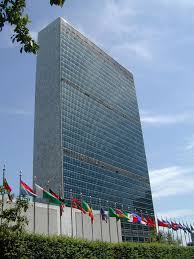NOTE: The author of this guest post is Karina Taylor. Karina is completing her first year as a graduate student at Seton Hall University’s School of Diplomacy and International Relations, where she specializes in International Organizations and Foreign Policy Analysis. She serves as an associate editor and contributing blogger for the university’s Journal of Diplomacy.
On Monday, April 13th, Seton Hall’s School of Diplomacy and International Relations played host to Ambassador Antonio de Aguiar Patriota, a career diplomat currently serving as Brazil’s Permanent Representative to the United Nations as well as the chair of the United Nations Peacebuilding Commission. This overlapping of responsibilities gives Amb. Patriota a unique perspective on both the United Nations’ evolving role in world affairs and his own nation’s ongoing ascent to greater prominence within the international community. During a daylong series of engagements, the Ambassador, students, and faculty discussed current-event topics like Cuban-American relations, Iran’s nuclear future, the nature of the BRICS economic alliance, and Saudi Arabia’s involvement in Yemen. Below are some key themes stressed by Ambassador Patriota:
The United Nations Security Council (UNSC) needs to expand its permanent member ranks to better represent the world as it is: This was a central theme of many questions Amb. Patriota fielded about the United Nations that became more explicit during his afternoon talk. During the interview session the ambassador admitted that the current ‘permanent five’ roster “represents the world of 1945 more than the world of 2015” and that he desires an alteration of the status quo. He qualified this by saying the status quo must be altered in regards to governance within the UN, and not the United Nation’s commitment to the goals illuminated by its charter, giving the example of the G7’s expansion to the G20 as proof that the global ‘North’ is acknowledging the world’s evolution towards a more multipolar reality. The UN is “an organization founded on peace and justice,” Amb. Patriota said, “and what is more just than inclusion?
When asked how he would change the Security Council, and whether or not the UN should “ditch the P5” altogether, the ambassador delivered quite the multifaceted response. He began by expressing his disappointment in the UN’s concentration on peace-and-security “hot zones” in the developing at the expense of monitoring the threats to peace that can emerge from developed, militarized nations. “Emerging powers”, he said “have different ways of inserting themselves into the existing system”, and utilizing the example of different Western powers’ reactions to the new Chinese-led development bank and how those differing positions may positively or adversely impact the Security Council before any discussion of expanding permanent membership even begins. In response to the common argument that an increase in voices on the Council would correspond to a rise in gridlocked decisionmaking, Amb. Patriota countered that we are already at an impasse on various issues both recent (Syria’s civil war) and longstanding (the Israeli-Palestinian conflict) due to the current ‘P5’s inherent bipolarity. “Since the 1960s – when the UN doubled in size – the UN has doubled again,” the ambassador explained. “Ideas about new permanent members should be taken seriously.”
Use of Force should be a last resort: When discussing the UN Security Council, the ambassador turned to growing demand for the use of force as a solution to an increasingly diverse list of international issues, stating that flouting international protocol in order to push unilateral action “can set terrible precedents…ultimately resulting in a disastrous game of ‘follow-the-leader’ that leaves world powers with fewer diplomatic options.” As part of his talk Amb. Patriota referred to the 2011 “Responsibility While Protecting” (RWP) document,which addresses what many see as issues overlooked by the earlier concept of “Responsibility to Protect” (R2P) – specifically the risks endured by civilian populations once intended use of force is implemented. Once we choose to protect people, how do we ensure we are doing it well? Use of force can worsen a situation by introducing more potential for violence into an already fraught scenario; we need more monitoring and transparency from those entrusted with keeping the peace in a manner that also keeps non-combatant populations safe. As an international community we need to protect “more responsibly and effectively”, Amb. Patriota said. “Inaction is a sin of omission, [but] over-reliance on force is often not [any] better”.
Finally, and most importantly, Amb. Patriota painted his audience a picture of a Brazil uniquely positioned to play the role of leading emerging power on the international stage and truly become emblematic of the world’s shift towards multipolarity. It has no desire for military supremacy and remains against nuclear proliferation (in a non-hypocritical way, since it possesses no nuclear weapons itself); serves as a peaceful leader in its immediate region; is concerned about climate change and sustainable development; acknowledges the need to engage with internal issues of inequality and human rights; remains dedicated to peacekeeping; and attempts to utilize multilateral arrangements that are outside the “bipolar box”, as he put it. Amb. Patriota’s Brazil is a nation ready to accept the international community’s evolution, and take full advantage of that shift in order to achieve the best possible result for the largest number of people. His Brazil sounds like part of a world we would all be fortunate to see emerge.
